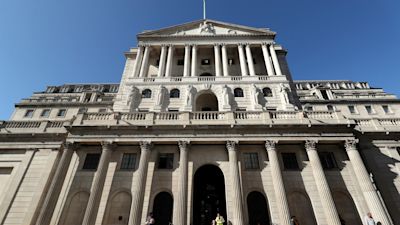Why the mini-budget threatened to bankrupt pension funds

I am going to try to explain why the Bank of England has gone into the market to buy up to £65bn of UK government bonds with maturities of 20 years or more, including £1bn today.
It all stems from a dramatic collapse in the price of these government bonds, called gilts, a collapse magnified by Friday's fiscally loose mini budget.
The collapse in these prices caused a liquidity crisis for what are called Liability Driven Investment funds, which have a gross value of roughly £1.5 trillion, of which a staggering £1 trillion has been invested in gilts and other bonds.
These are largely leveraged funds, which means that when they buy gilts, they frequently use them as collateral to raise cash (in what's known as the Repo market), then use the cash to buy more gilts, then pledge the gilts again and buy more gilts, and so on.
Now the risk of raising money in this way is that when the value of that collateral collapses, which it has done with the crash in gilt prices, the funds have to somehow find cash either to repay the money they've borrowed or pledge more collateral.
This pressure was forcing them to sell more gilts and other assets, driving down the prices of those gilts and other assets, in a way that could undermine their solvency and the solvency of other important institutions that are invested in these gilts (and other assets).
It risked a markets bloodbath. And the point I haven't made until now (sorry) is these Liability Driven Investment funds (LDIs) were owned by final salary pension schemes, as devices to better match their liabilities to millions of pensioners with future income from assets.
The huge immediate risk was that these pension funds themselves would become formally insolvent, because their liabilities to the LDIs would be greater than their assets.
So what the Bank of England has today tried to do, with these emergency purchases of gilts, is to drive up the price of gilts, to give time to the LDIs to sell assets in a more orderly way, such that the re-pricing of the gilts doesn't lead to that markets bloodbath.
And so far, it seems to be working. But the Bank of England accepts that all it is doing is managing the transition to lower gilt prices, and higher yields (or interest rates on government bonds), in an orderly way.
And it accepts that gilt prices may ultimately fall back to those lower levels. Which means that it will be incurring losses on the £65bn of bonds it has committed to buy.
Except actually the losses won't be the Bank's losses.
The losses will sit with taxpayers, since Kwarteng and the Treasury have indemnified the Bank of England for any falls in value of the bonds it buys. Or to put it another way, this is not some magic rescue.
It will cost someone a lot of money. And that someone is probably the government, and therefore taxpayers.
Finally, though, it should not be the case that if you are in a final salary pension scheme your pension is at risk.
The reason is that the pension regulator calculates the value of a pension scheme's liabilities by using a discount rate on the future cash value of pensioner payments that is linked to the gilt yield, and when that yield rises, the prevent value of those liabilities actually falls.
So here is the almighty paradox. Pension funds could have collapsed today because of a shortage of cash or liquidity. But having been bailed out by the Bank of England, at some cost to taxpayers, pension funds should emerge stronger. Strange but true.
None of this, however, absolves Kwasi Kwarteng or Liz Truss from responsibility from a wholly avoidable crisis.
If they hadn't pushed the fiscal boat out with their too loose mini budget, the Bank of England would not have had to wade into the market with £65bn of our money.
Want a quick and expert briefing on the biggest news stories? Listen to our latest podcasts to find out What You Need To Know